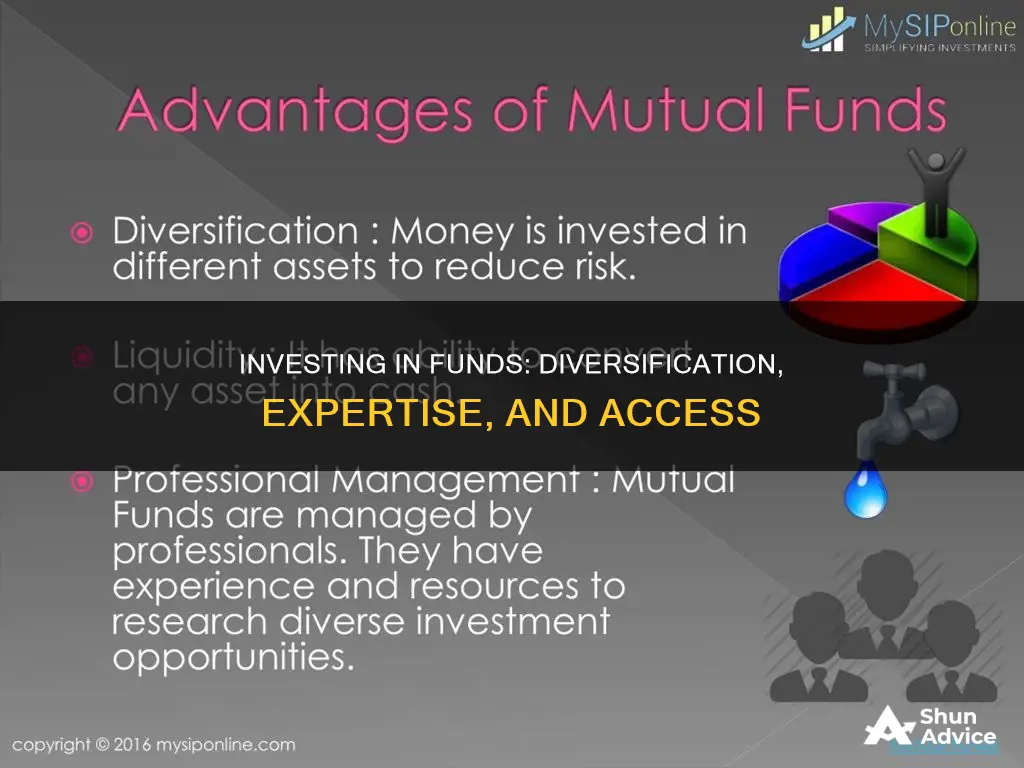
Investment funds are a popular strategy for obtaining returns. They are a type of collective investment scheme that pools money from a group of individuals to invest in various financial instruments. The fund manager then invests the money in a wide range of assets, such as stocks, bonds, property, cash, commodities, and even other funds.
One of the main benefits of investing in funds is that it gives small investors access to markets that would otherwise be difficult to access individually. It also helps to diversify investments, as your money is spread across multiple assets, reducing overall risk. Fund managers use their expertise and knowledge to research and pick the best opportunities in a chosen sector, saving investors time and effort.
There are different types of funds to choose from, including actively managed funds, passive funds, money market funds, real estate investment trusts, foreign funds, bond funds, stock funds, and absolute return funds. When choosing a fund, it is important to consider the risks, costs, and other features, as well as your own financial situation and investment goals.
What You'll Learn
- Funds are a good way to access markets that would be hard to invest in individually
- Fund managers are experts who spend time researching and picking the best opportunities
- Funds are a great way to diversify your portfolio and spread risk
- Funds are a good option for long-term investing
- Funds are generally less risky than buying shares

Funds are a good way to access markets that would be hard to invest in individually
Investment funds pool money from a group of individuals, allowing investors to access markets that would be hard to invest in individually.
Funds are collective investments, where investors' money is pooled together and spread across a wide range of underlying investments. This helps investors spread their overall risk. The fund manager buys, holds and sells investments on investors' behalf.
Funds are a good way to access markets that would be hard to invest in as an individual because they allow investors to pool their money. This means that investors can access a wide range of underlying investments and spread their overall risk. For example, a UK equity fund is likely to hold a wide number of stocks from a broad set of different British industry sectors.
Funds also give investors access to the expertise of fund managers, who research and pick the best opportunities in a chosen sector. Fund managers can also offer investors a selection of funds with varying risk and rates of return.
Funds are generally less risky than buying shares as they often include a variety of shares or assets, and the fund manager works on behalf of a group of investors for a fee.
Vanguard Funds: Smart HSA Investment Strategies
You may want to see also

Fund managers are experts who spend time researching and picking the best opportunities
Fund managers are experts who spend time researching and selecting the best opportunities for investors. They are responsible for buying, holding, and selling investments on behalf of the investors in the fund. The fund manager's expertise and knowledge help to guide investment decisions and reduce risk.
Fund managers have the skills and resources to thoroughly research and analyse potential investments. They consider various factors, such as market trends, financial data, and industry insights, to identify the most promising opportunities. This research enables them to make informed decisions about which assets to include in the fund's portfolio. Their expertise helps them navigate complex financial landscapes and identify investments that align with the fund's goals and risk tolerance.
Fund managers also play a crucial role in selecting the best opportunities from the vast array of available options. They carefully evaluate potential investments, considering factors such as growth potential, risk factors, and how each investment fits within the overall portfolio. By applying their expertise, fund managers aim to maximise returns while managing risk effectively.
Additionally, fund managers actively monitor the performance of the fund's investments. They stay abreast of market changes, economic trends, and company-specific developments to ensure that the selected opportunities continue to meet the fund's objectives. If necessary, they make adjustments to the portfolio by buying or selling assets to optimise returns and manage risk.
Fund managers also have access to a wide range of investment options. They can invest in various assets, including stocks, bonds, cash, derivatives, fixed-income securities, and other financial instruments. This diversification of investments helps to further mitigate risk and maximise potential returns.
In summary, fund managers are experts who dedicate their time to researching, selecting, and managing investments on behalf of the fund's investors. Their expertise, combined with their ability to diversify investments and access a broad range of opportunities, makes them well-positioned to make informed decisions and optimise the fund's performance.
How Do Funds Benefit from Investing in CDs?
You may want to see also

Funds are a great way to diversify your portfolio and spread risk
Investing in funds is a great way to diversify your portfolio and spread risk. When you invest in a fund, your money is pooled with that of other investors and spread across a wide range of underlying investments. This diversification is a key advantage of funds, as it helps to spread your overall risk.
Funds are typically made up of a single asset type, usually shares or bonds, but some specialise in alternative investments such as commercial property. However, some portfolios have exposure to many different asset types. Multi-asset funds, for example, can hold a mixture of shares, bonds, property, cash, commodities, and even other funds.
Funds are also a great way to access a wide range of markets and countries. For example, if you're interested in investing in Europe, you could invest in a fund that focuses on this region.
Another benefit of investing in funds is that you can benefit from the expertise of a fund manager, who will research and pick the best opportunities in a chosen sector. Funds can be actively managed, where the fund manager aims to do better than a benchmark to fit an investment goal, or passively managed, where the fund aims to closely track the performance of a stated index.
Overall, funds are a great way to gain exposure to a diverse range of investments and reduce your risk. By investing in a fund, you can benefit from the expertise of a fund manager and access a wide range of markets and asset types.
Emergency Fund Strategies: Philippines Investment Options
You may want to see also

Funds are a good option for long-term investing
Funds are also a good option for those who don't want to spend time picking and choosing individual investments themselves. The fund manager uses their expertise and knowledge to research and pick the best opportunities in a chosen sector, saving you time and effort.
Additionally, funds are generally considered less risky than buying individual shares, as they often include a variety of shares or assets, and the fund manager works on behalf of a group of investors for a fee. This diversification can help to spread the risk, although it's important to note that some funds can still be high-risk, depending on their focus and the combination of assets.
When investing in funds, it's recommended to take a long-term approach (typically at least five years) to ride out any short-term volatility and benefit from greater returns over time. This also gives your investments time to grow and compound, increasing your chances of making gains rather than losses.
Finally, funds offer a wide range of choices, enabling you to control risk, diversify across different assets, and access numerous markets and countries. This flexibility allows you to find funds that match your investment goals, risk tolerance, and time horizon.
NHCU's Investment Strategies: Where Are Funds Allocated?
You may want to see also

Funds are generally less risky than buying shares
Funds are generally considered a safer investment than individual stocks. While both can help you earn solid returns, funds are less risky.
A fund is a pooled investment containing many stocks and other assets from multiple companies. By investing in a fund, you are buying into many investments at once, spreading your investment across hundreds of companies instead of just one. This diversification of your portfolio helps to reduce the impact of a single investment and minimises risk. It is unlikely that every company within a fund will experience losses at the same time, protecting your portfolio from volatility.
Funds are also a convenient way to invest, as they are actively managed by professionals who do all the research and stock-picking. This means that investors can leave the complex decision-making to an expert. Funds are therefore ideal for beginners who want to reap the benefits of the stock market without any prior investment knowledge.
However, funds do come with some drawbacks. They take control out of the investor's hands, limiting you to what a fund manager thinks is best. There are also often ongoing management fees, which can be high if the fund is actively managed.
What's the Return on Investment for Founders?
You may want to see also







